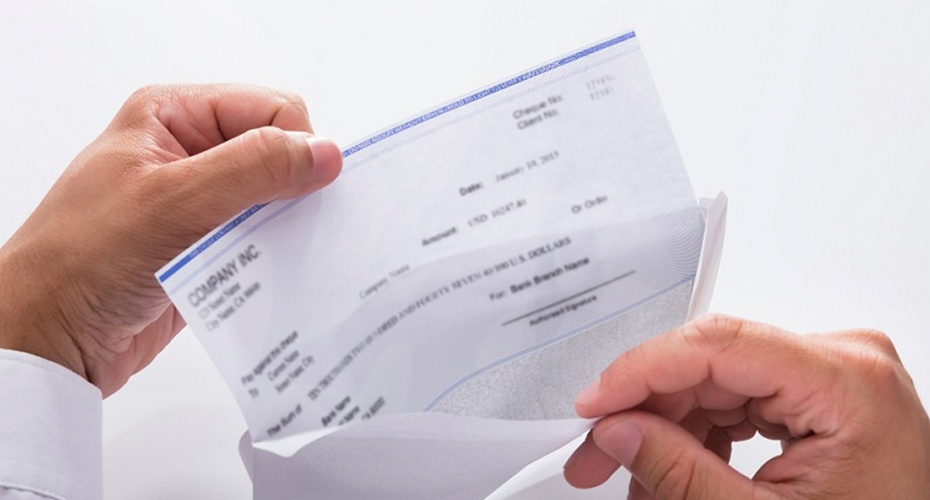Sep 14, 2020
Tips to prevent new scam
Beware of suspicious checks, fraud experts are warning, as criminals are using the ongoing health crisis to put a new twist on an old scheme aimed at stealing money from the vulnerable.
The mechanics of the scheme are well known to law enforcement: A scammer sends a bad check for a certain amount, say $1,000. The victim deposits the check and before the bank can alert them that the check is bad, the fraudster reaches out to the victim and claims to have issued the check in the wrong amount, asking for some of it (say, $200) to be returned. The victim sends the fraudster the $200, the bad check never clears, and the victim is out the cash.
Old scam, new twist
These days, fraudsters are taking advantage of the pandemic, impersonating health insurers and saying they are issuing premium rebate checks.
“The anatomy of the scam is all the same, the process is all the same, now they are just using health care, using a trusted brand to make people believe this is legitimate,” said Eva Velasquez, the CEO of the nonprofit Identity Theft Resource Center.
Trusted brands often deal with imposter scams, Velasquez said, because the criminals will leverage the well-known name and an entity that the victim is likely to trust without suspecting a scammer lies in wait.
It is “an old scheme with a COVID twist,” agreed in-house counsel Rachel Wacht of Blue Cross Blue Shield of Massachusetts, which has issued rebates this year. The health plan has not seen members targeted, but is aware of the scam elsewhere in the country.
Economic conditions, Wacht said, are perfect for any scammer who wants to lure a victim with the promise of a quick buck.
“There are a lot of folks who are financially strapped right now,” she said, due to the high unemployment rate.
If someone claiming to be Blue Cross Blue Shield sends a check in the mail, the recipient should be suspicious, especially if the sender then claims that the check is in the wrong amount, said Blue Cross Blue Shield of Massachusetts senior director for fraud investigation and prevention Jennifer Stewart, noting health insurance rebates usually are processed through employers and appear as a credit on the next bill.
While a small percentage of Blue Cross members will receive a refund check, Stewart says “In most cases, we are not suddenly going to be cutting checks across our membership.”
The pandemic has been accompanied by a wave of fraud exploiting the fears people have right now about the virus, as Coverage has reported.
U.S. Attorney Andrew Lelling’s office said it is aware of variants of the “advanced payment” scam being reported in Massachusetts.
“As our communities take extraordinary measures to confront the coronavirus outbreak, some may view this as an opportunity to prey on the public’s fears and anxieties,” Lelling said in a statement. “The Department of Justice is now focused on cybercrime, sale of counterfeit goods, treatment scams and other health care and investment scams arising from the pandemic.”
How to protect yourself
Experts say there are a number of steps people can take to avoid becoming a scammer’s next victim. Attorney General Maura Healey’s office has issued guidance to consumers starting with: “if you receive a check you’re not expecting, don’t cash it.”
Healey’s office, which has heard of similar check scams with criminals posing as utility or green energy companies, stressed to consumers: “don’t rush.
Scammers will often try to get you to make a mistake by creating a false sense of urgency.
- the AGs guidance states.
“They may say that the offer is only available for a limited time or that your money must be claimed immediately. Don’t fall for it. If a refund is legitimate it will still be there tomorrow or next week.”
If consumers receive checks from companies they have done business with in the past, take the time to contact the company using a trusted email or phone number, experts say.
“Always call the issuing entity to verify the legitimacy of the payment,” Wacht said.
Stewart said health plan members should be careful about giving out too much information over the phone if they find themselves talking with someone who is not calling from a known number.
“Fraudsters can learn – and sell -- a great deal of information over the dark web,” she said, “and health insurance information should be treated with the same care as financial information.”
Did you find this article informative?
All Coverage content can be reprinted for free.
Read more here.

